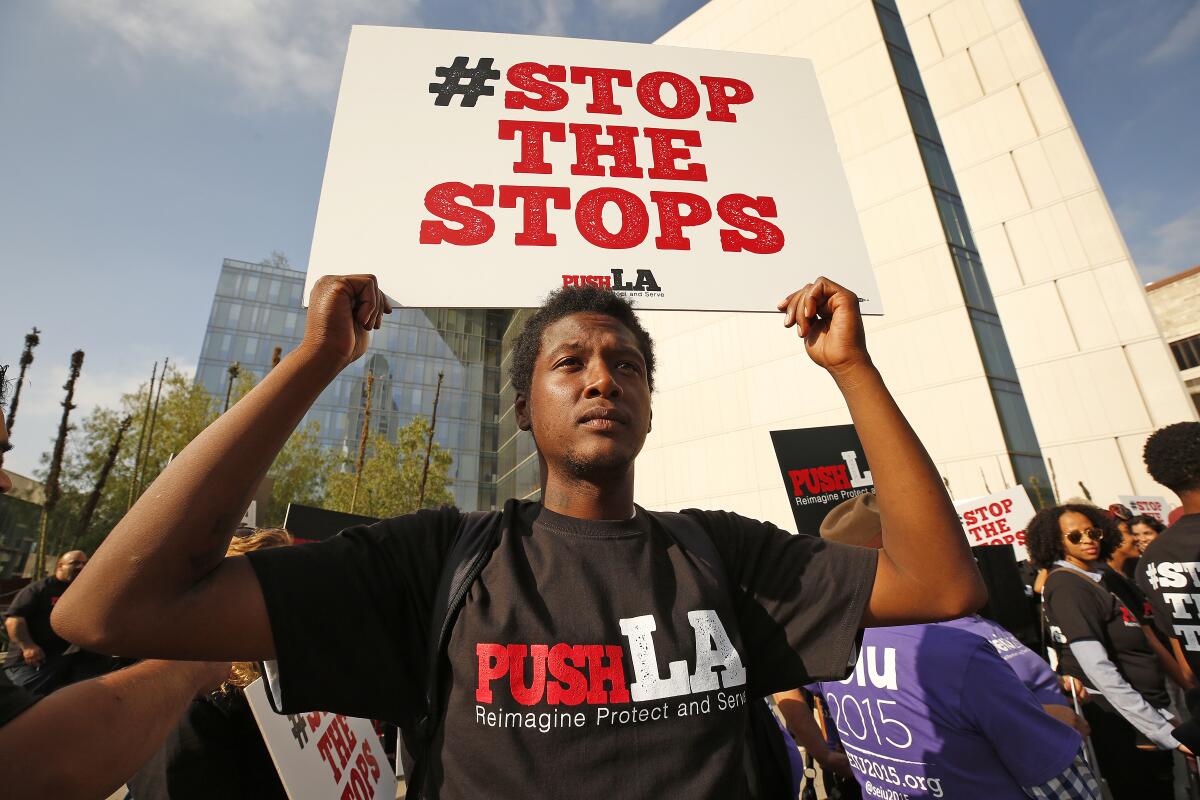Black drivers face more police stops in California, state analysis shows

SACRAMENTO — Black drivers in some of California’s largest cities are stopped and searched by police at higher rates than white and Latino motorists, according to a new state analysis.
The state Department of Justice report, released Thursday, found that black people accounted for 15% of all stops examined in California, though they make up only about 6% of the state population, according to U.S. census figures. White and Latino drivers were stopped at rates generally proportional to population estimates. Police were most likely to stop black men they perceived as being between the ages of 25 and 34.
The findings, the first scrutiny of racial bias in police stops released under a 2015 state law, appear to largely confirm what independent researchers and black drivers have long discussed: “Driving while black” represents an elevated risk of a law enforcement encounter.
“The data released further verifies what we know to be true about racial profiling happening here in L.A. and throughout California by the police,” community activist Alberto Retana said. “People of color, especially black people, aren’t surprised.”
Los Angeles Times investigations last year found that Los Angeles police in the Metropolitan Division stopped black drivers at a rate more than five times their share of the city population, and the LAPD was more than four times as likely to search African American drivers during stops overall, compared with white motorists. The investigations prompted Mayor Eric Garcetti and community activists including Retana to call for reforms, and recently, the Metro division cut back on pulling over vehicles as its primary crime-fighting tool.
Other investigations have found similar disparities in Sacramento, Oakland, San Jose and in cities across the country.
The data included details for vehicle and pedestrian stops of 1.8 million people at the state’s eight largest law enforcement agencies for a six-month period from July 2018 through December.
The California Highway Patrol, a statewide agency charged with safeguarding highways, conducted the most stops, pulling over more than 1 million drivers. The Los Angeles Sheriff’s Department and Los Angeles Police Department combined stopped more than 470,000 drivers. The San Diego Sheriff’s Department, San Diego Police Department, Riverside Sheriff’s Department, San Bernardino Sheriff’s Department and San Francisco Police Department also contributed statistics.
“The report is just the beginning of information that will allow even greater transparency for law enforcement and our communities,” said Kings County Sheriff Dave Robinson, a member of the statewide board overseeing the data collection.
The statistics were collected as part of the Racial and Identity Profiling Act of 2015, signed by then-Gov. Jerry Brown. Though it is the third annual report released under the mandate, it is the first to contain the stop data. The law will require every law enforcement agency in the state to collect and report profiling data by 2023.
Police also searched black drivers at a rate nearly three times that of white motorists, the report found. About 6% of white drivers were searched after a stop, and nearly 10% of all drivers were similarly checked. But the rate jumped to nearly 19% for black drivers, the highest percentage for any racial category examined.
Researchers have warned that stop data alone do not confirm bias in policing. Ron Lawrence, president of the California Police Chiefs Assn. and chief of Citrus Heights Police Department in Northern California, cautioned that the data might not provide a complete picture of why officers make stops. Lawrence said the report lacked details about whether stops occurred in high- or low-crime areas, and it didn’t provide enough context about whether the stops were initiated by officers or other means, such as a call for service.
“A lot of those nuances aren’t in there,” Lawrence said. “It’s hard to interpret the ‘why’ behind some of this.”
Craig Lally, president of the Los Angeles Police Protective League, the union representing officers, said in a statement that the reporting was “skewed and inaccurate” in part because it required officers to give their perception of a person’s demographics, including race or ethnicity “in portions of California where a significantly higher amount of people of color live.”
Lally also said the report failed to examine behavior witnessed by officers that could have influenced their actions.
To analyze some of why and how officers conduct stops, the report also looked at how often officers found contraband or evidence after a search.
“Search yield” data can help ferret out bias if data show that a certain demographic is searched more often than others, but with fewer instances of contraband being found. The data released Thursday found that officers were most likely to find contraband when searching white drivers. Law enforcement searches of people of color turned up contraband at lower rates.
The report also found a disparity in consequences. While white drivers were more likely than black motorists to receive citations, they are less likely to be arrested. Black drivers were cited in about 37% of stops and arrested in about 15% of incidents. White drivers were arrested in about 11% of stops, but cited in a higher proportion.
Overall, drivers perceived as of Middle Eastern or South Asian descent were most likely to receive a ticket, with more than 60% being cited after a stop, compared with about half of white drivers.
Eva Bitran, a staff attorney with the ACLU of Southern California, pointed out that the discrepancies in stops were more pronounced when the data for the California Highway Patrol were removed, possibly in part because that agency largely does not engage in community-based policing. Examining individual data at the other seven reporting law enforcement agencies might provide a more nuanced view of urban policing in California, she said.
The report shows that of the nearly 337,000 stops reported by the Los Angeles Police Department, about 28% involved African American motorists, though African Americans account for 9% of the city’s population, according to U.S. census data. White drivers made up about 18% of LAPD stops, and account for about 28% of the city’s population.
The Los Angeles County Sheriff’s Department reported nearly 137,000 stops, about 17% of them involving African American drivers. African Americans make up about 8% of the county population, though the report’s authors used a weighted measure of census data for more accurate comparisons. Sheriff’s deputies stopped white drivers in about 24% of incidents. Twenty-six percent of the county population is white, according to the report.
Melina Abdullah, a Cal State L.A. professor and Black Lives Matter organizer who has been an outspoken critic of law enforcement, said the stops are “an albatross around [the] necks” of black people, leading to community mistrust, large fines, increased insurance rates and incarceration.
“The experience of driving while black has not changed,” Abdullah said. “The recognition that it is part of black life ... is a constant weight.”
More to Read
Sign up for Essential California
The most important California stories and recommendations in your inbox every morning.
You may occasionally receive promotional content from the Los Angeles Times.










